美国社会各阶层解析 英文版 social class
- 格式:ppt
- 大小:2.15 MB
- 文档页数:3
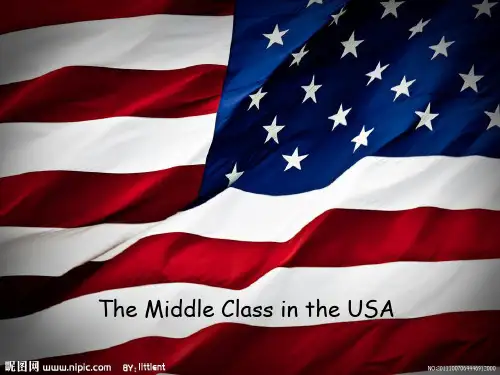
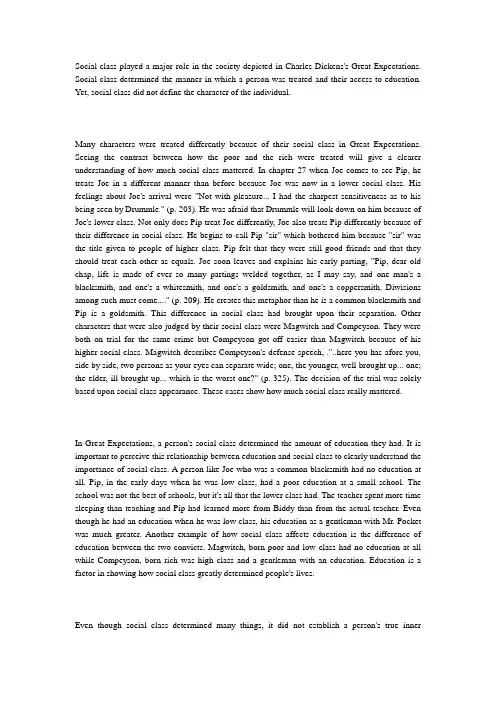
Social class played a major role in the society depicted in Charles Dickens's Great Expectations. Social class determined the manner in which a person was treated and their access to education. Yet, social class did not define the character of the individual.Many characters were treated differently because of their social class in Great Expectations. Seeing the contrast between how the poor and the rich were treated will give a clearer understanding of how much social class mattered. In chapter 27 when Joe comes to see Pip, he treats Joe in a different manner than before because Joe was now in a lower social class. His feelings about Joe's arrival were "Not with pleasure... I had the sharpest sensitiveness as to his being seen by Drummle." (p. 203). He was afraid that Drummle will look down on him because of Joe's lower class. Not only does Pip treat Joe differently, Joe also treats Pip differently because of their difference in social class. He begins to call Pip "sir" which bothered him because "sir" was the title given to people of higher class. Pip felt that they were still good friends and that they should treat each other as equals. Joe soon leaves and explains his early parting, "Pip, dear old chap, life is made of ever so many partings welded together, as I may say, and one man's a blacksmith, and one's a whitesmith, and one's a goldsmith, and one's a coppersmith. Diwisions among such must come...." (p. 209). He creates this metaphor than he is a common blacksmith and Pip is a goldsmith. This difference in social class had brought upon their separation. Other characters that were also judged by their social class were Magwitch and Compeyson. They were both on trial for the same crime but Compeyson got off easier than Magwitch because of his higher social class. Magwitch describes Compeyson's defense speech, ."..here you has afore you, side by side, two persons as your eyes can separate wide; one, the younger, well brought up... one; the elder, ill brought up... which is the worst one?" (p. 325). The decision of the trial was solely based upon social class appearance. These cases show how much social class really mattered.In Great Expectations, a person's social class determined the amount of education they had. It is important to perceive this relationship between education and social class to clearly understand the importance of social class. A person like Joe who was a common blacksmith had no education at all. Pip, in the early days when he was low class, had a poor education at a small school. The school was not the best of schools, but it's all that the lower class had. The teacher spent more time sleeping than teaching and Pip had learned more from Biddy than from the actual teacher. Even though he had an education when he was low class, his education as a gentleman with Mr. Pocket was much greater. Another example of how social class affects education is the difference of education between the two convicts. Magwitch, born poor and low class had no education at all while Compeyson, born rich was high class and a gentleman with an education. Education is a factor in showing how social class greatly determined people's lives.Even though social class determined many things, it did not establish a person's true innercharacter. Realizing this will play a part in proving that social class did matter in most but not all cases. For example, the lowest class people were Joe, Biddy, Magwitch, and Orlick. Joe and Biddy were very poor but had very good hearts. Joe was always there for Pip and Biddy had moved in to help Mrs. Joe. Magwitch was a dirty convict of the lowest class, but he turned out to be a very caring and generous man. Orlick was low class and his character also turned out to be very low because he was a murderer. The fact that there are both good and cold hearted people in the lower class shows that class has no connection with how people really are. Another example is the richer class. This includes Ms. Havisham, Estella, Herbert, Jaggers, and Wemmick. Ms. Havisham and Estella were both very wealthy but they had no heart and their intentions were to bring hell to all men. While Herbert was the opposite, he was a true friend to Pip and always stayed by his side. Jaggers and Wemmick also in the higher class had supported Pip through his gentleman years. Being aware that not all of the high class were necessarily good people states the fact that class does not determine character. Even though class mattered in most things, this is an example it did not take part in.After exploring how class was associated with the way people were treated, how much education they had, but not with their true character, these facts have become easy to discern. With these points proved, the fact that social class mattered in most but not all things had no doubt become clear in the mind. It is strange how different social class had been back in Pip's days and now. Where will social class lead next?Dickens' personal experiences growing up obviously play a large part in his novel Great Expectations. Seeing his own father sent to debtor's prison and witnessing firsthand his loss of status clearly sharpened his own sense of the differences in class in England. His novel exemplifies the Victorian desire for upward mobility and their fantasy that anyone can rise to higher social status if only they can receive some secret wealth. In the novel, those who work hard and are good at heart end up with situations much improved by the end of the novel (Joe, Wemmick, Herbert, Matthew Pocket, etc...). Conversely, those who are wicked or take advantage of others tend to experience negative consequences, up to and including death (Compeyson, Drummle, Orlick, etc...). The possibility for redemption exists, but a character has to realize the error of their ways before it can be granted (Estella, Miss Havisham, and Pip himself).Pip's personal journey of realization forms the center of the novel. Throughout the story, Pip is exposed to all levels of the class spectrum. His journey takes him from poor blacksmith's apprentice, to the aristocratic realm of Miss Havisham, into the world of amiddle-class London gentleman, back to his humble beginnings, and finally to a prosperous life abroad. Along his journey, he learns a valuable lesson about his own prejudices and harsh judgments of those close to him. While Pip clearly comes to realize the folly of his own prejudice, there is no indication in the novel that he learns a lesson about the injustices of the class system as a whole. Pip seems completely absorbed in the microcosm of his own companions, and never expands his new-found awareness to the larger level.In the beginning, Pip is a caring, thoughtful boy who is largely ignorant of the larger world of class in which he lives. In his innocence, he honestly wishes to help the starving convict he finds in the marshes despite threats against his life. He feels bad for robbing his own house and for the necessity of lying to his sister despite her tyranny over him. It's only when he's introduced to Estella that his sense of class distinction begins to develop. In his naiveté he takes every word she says as fact. He is depressed by the realization that he is "common" and "coarse" and that all those he loves apparently unknowingly possess the same faults. Pip begins to believe that higher status, manners, and wealth are synonymous with one's value as a person. When news of his "expectations" arrives, his ego swells considerably almost immediately. He's sure that his "selection" is a sign of his great personal worth and it makes all the "common" people with which he's always associated seem beneath him. The change in attitude of those in the town toward him only reinforce this, and by the time he's ready to leave his village he wishes to walk to the coach without Joe because he's afraid of the stark contrast between them. While his attitude has definitely changed because of his awareness of class difference, he never seems to expand this belief beyond the circle of people he's already familiar with. He believes he's better than those in his village, but he never extrapolates that belief into a larger context.When he arrives in London, Pip is promptly reunited with Herbert Pocket. Herbert serves as his major role model of a gentleman, and consequently Pip strives to emulate him. Herbert and his father seem to be genuinely good people. Herbert passes on his father's philosophy of gentility which includes refinement of emotion and a good heart. Pip believes that by simply emulating Herbert's behavior he can become a "good" person like him. He initially fails to learn the larger lesson of Herbert's words and instead concentrates on learning manners and increasing his education, thinking that simply acting like a gentleman is all it takes to be a decent person.Pip is an incredibly selfish figure throughout most of the novel. His priorities are clearly misaligned. He wants to learn to be a gentleman because being a gentleman makes him a good person, but he fails to capitalize on seemingly-obvious opportunities to help out those close to him. Pip finds himself in London in a greatly-improved financial situation, he seeks ways to improve his own personal decency through manners and refinement, yet he never spares a thought for the good he could do for his afflicted sister with just a small portion of his income. Just a few pounds would seem a fortune to his sister and Joe, and he never gives them a second thought, concentrating only on himself and those he sees as being more worthwhile. It's as if the residents of his village no longer exist to him. It's this fierce selfishness that never allows him to awaken to the larger problems of class in which he's immersed.It's only when the true source of Pip's upward mobility is revealed that he begins to question his perceptions. When Magwitch is revealed as Pip's benefactor, all his preconceptions about his "selection" and his destiny with Estella are shattered. Instead of having been recognized by an upper-class individual as a truly worthy person, he's been the instrument of a convict's retribution against society. That night, after he's able to ponder his situation, he finally begins to realize the horrible way he's treated Joe. It's only then that he can begin to realign his idea of what makes a person valuable. However, he again spares no thought for the countless other members of the lower class who have undoubtedly been wronged by others just as he has wronged Joe.Eventually, Pip is able to forgive Miss Havisham for her deceptions and his own misfortune. He refuses her offer to financially compensate him and instead suggests she support Herbert's business endeavors. This generous deed comes back to save him by the end of the novel, when he ends up working for the firm his and Miss Havisham's money helped support.Further loosening of his false beliefs in class determining personal worth is evident in his treatment of Magwitch. Initially he views Magwitch as little more than an uncivilized animal. Eventually Pip's feelings toward Magwitch soften to a kind of loving gratitude. He begins to see that a man can be essentially good despite a rough exterior. Pip puts himself through great personal risk and inconvenience in his quest to save Magwitch. Though he fails to get him out of the city, Pip's care of and devotion to Magwitch up until his eventual death is unwavering, even after Pip learns that he will no longer be receiving any of Magwitch's money.The true measure of Pip's journey is the fact that by the end of the novel he can actually feel affection for the convict he viewed as little more than an animal for much of the story. However, despite the fact that he's realized the folly of his own misconceptions regarding those close to him, we never see him view this knowledge as belonging in a larger context. He learns the value of hard work and spiritual earnestness, and his good deeds bring him positive returns, but his realizations do not seem to lead him to an understanding of the fullest impact of class prejudice.Allegorically, Dickens does seem to intend that the reader discern something about the larger context in which Pip's story takes place. The characters within the novel clearly represent the different social levels of England's class society and their actions exemplify the ways in which those classes interact. Pip as a character, however, never comes to see his own experience as indicative of problems on a larger scale.。
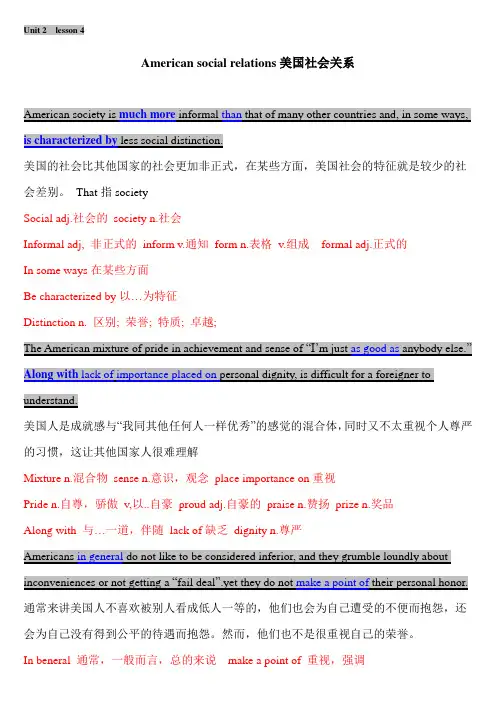
Unit 2 lesson 4American social relations美国社会关系美国的社会比其他国家的社会更加非正式,在某些方面,美国社会的特征就是较少的社会差别。
That指societySocial adj.社会的society n.社会Informal adj, 非正式的inform v.通知form n.表格v.组成formal adj.正式的In some ways在某些方面Be characterized by以…为特征Distinction n. 区别; 荣誉; 特质; 卓越;美国人是成就感与“我同其他任何人一样优秀”的感觉的混合体,同时又不太重视个人尊严的习惯,这让其他国家人很难理解Mixture n.混合物sense n.意识,观念place importance on重视Pride n.自尊,骄傲v,以..自豪proud adj.自豪的praise n.赞扬prize n.奖品Along with 与…一道,伴随lack of缺乏dignity n.尊严通常来讲美国人不喜欢被别人看成低人一等的,他们也会为自己遭受的不便而抱怨,还会为自己没有得到公平的待遇而抱怨。
然而,他们也不是很重视自己的荣誉。
In beneral 通常,一般而言,总的来说make a point of 重视,强调Inferior adj.下等的grumble about [grʌmbl]报怨inconvenience n.不方便,麻烦在这一方面,为了更好展示欧洲人和美国人的不同反映,John Whyte 在《美国语言和方式》这本书里给了我们如下的描述。
Illustration n.说明,例证account n.记述有位欧洲的教授曾在美国访问,他有次收到一份在医院接受治疗的账单,实际上他并没有接受过任何治疗。
随附账单还有一封措施很强烈的信件。
Accompany v. [ə’kʌmpni] 陪伴pay v.付款payment n.付款company n.作伴显然是名字出现了差错,但是这位教授的个性及财务方面的廉洁被这种非难彻底地唤醒,他就写了一封措辞强硬的回信(美国人也可能会这么做的)。

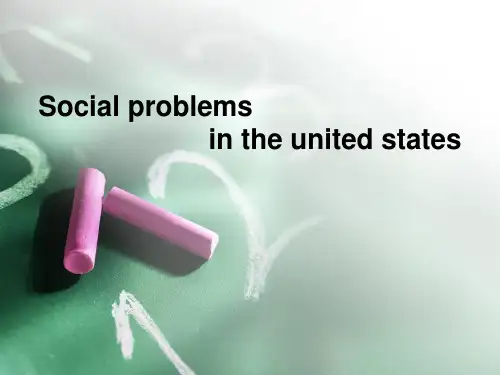
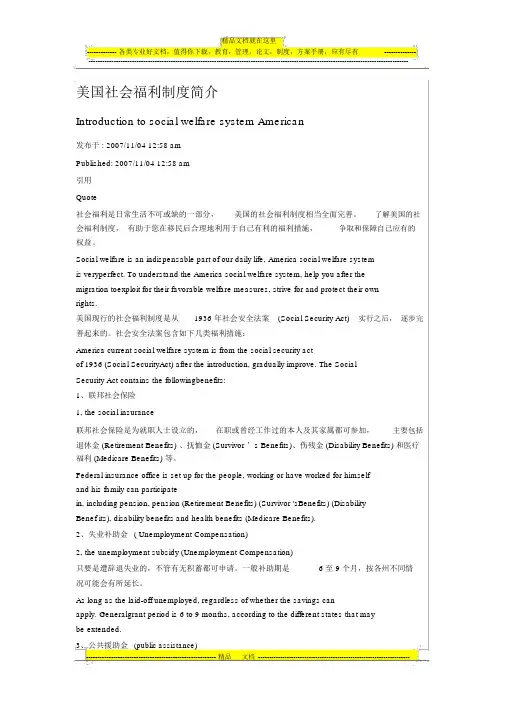
精品文档就在这里------------- 各类专业好文档,值得你下载,教育,管理,论文,制度,方案手册,应有尽有----------------------------------------------------------------------------------------------------------------------------------------------------------美国社会福利制度简介Introduction to social welfare system American发布于 : 2007/11/04 12:58 amPublished: 2007/11/04 12:58 am引用Quote社会福利是日常生活不可或缺的一部分,美国的社会福利制度相当全面完善。
了解美国的社会福利制度,有助于您在移民后合理地利用于自己有利的福利措施,争取和保障自己应有的权益。
Social welfare is an indispensable part of our daily life, America social welfare systemis veryperfect. To understand the America social welfare system, help you after themigration toexploit for their favorable welfare measures, strive for and protect their ownrights.美国现行的社会福利制度是从1936 年社会安全法案(Social Security Act)实行之后,逐步完善起来的。
社会安全法案包含如下几类福利措施:America current social welfare system is from the social security actof 1936 (Social SecurityAct) after the introduction, gradually improve. The SocialSecurity Act contains the followingbenefits:1、联邦社会保险1, the social insurance联邦社会保险是为就职人士设立的,在职或曾经工作过的本人及其家属都可参加,主要包括退休金 (Retirement Benefits) 、抚恤金 (Survivor ’s Benefits)、伤残金 (Disability Benefits) 和医疗福利 (Medicare Benefits) 等。
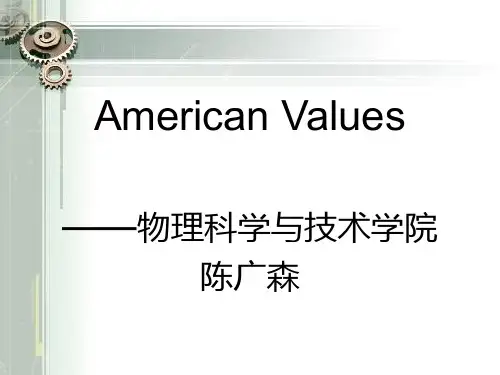

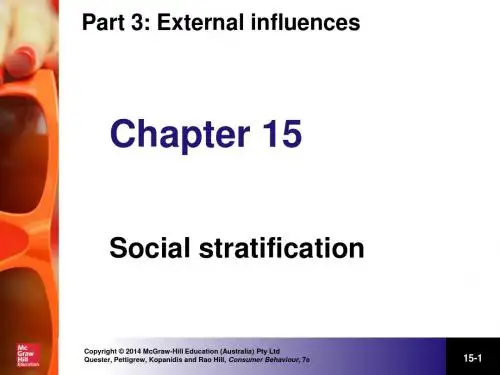
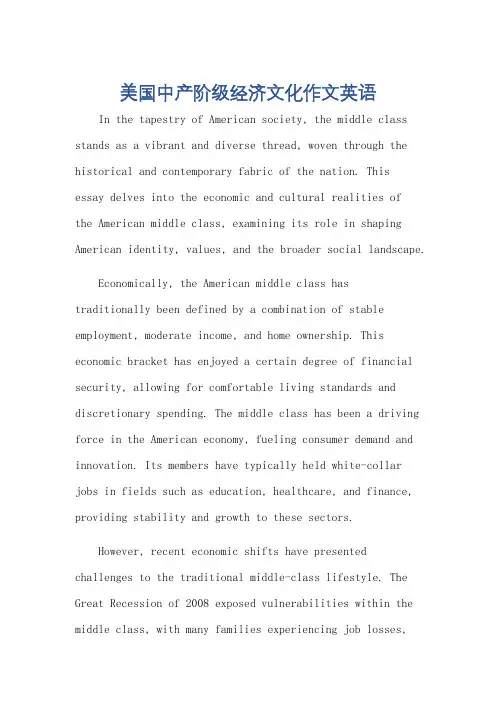
美国中产阶级经济文化作文英语In the tapestry of American society, the middle class stands as a vibrant and diverse thread, woven through the historical and contemporary fabric of the nation. Thisessay delves into the economic and cultural realities ofthe American middle class, examining its role in shaping American identity, values, and the broader social landscape. Economically, the American middle class hastraditionally been defined by a combination of stable employment, moderate income, and home ownership. This economic bracket has enjoyed a certain degree of financial security, allowing for comfortable living standards and discretionary spending. The middle class has been a driving force in the American economy, fueling consumer demand and innovation. Its members have typically held white-collarjobs in fields such as education, healthcare, and finance, providing stability and growth to these sectors.However, recent economic shifts have presented challenges to the traditional middle-class lifestyle. The Great Recession of 2008 exposed vulnerabilities within the middle class, with many families experiencing job losses,foreclosures, and financial instability. The rise of income inequality and the cost of living has made it increasingly difficult for middle-class families to maintain their economic footing.Culturally, the American middle class has played a pivotal role in shaping national values and identity. It has been a bastion of liberalism, promoting social progress and equality. The middle class has been at the forefront of movements such as civil rights, women's rights, and environmentalism, driving change and progress within American society.Middle-class culture has also been marked by a strong sense of community and social responsibility. Middle-class families have typically valued education, hard work, and upward mobility, passing these values down through generations. They have supported public institutions like schools and libraries, investing in their children'sfutures and contributing to the broader social welfare.However, cultural shifts within the middle class have also been evident. With the rise of technology and social media, middle-class culture has become increasinglyglobalized and diverse. Middle-class families now have access to a wider array of cultural experiences and perspectives, challenging traditional norms and values.In conclusion, the American middle class remains a vibrant and diverse force within American society, shaping both economic and cultural realities. Its members have faced challenges and opportunities in recent years, but their resilience and adaptability have been key to their continued relevance and influence. As the nation continues to evolve, the middle class will play a critical role in defining its future identity and values.**美国中产阶级的经济文化现实**在美国社会这幅丰富多彩的织锦中,中产阶级就像一根充满活力和多样性的线,贯穿于国家和民族的历史与现实之中。

美国留学前要了解的社会知识——美国中产阶级对美国人而言,最可怕的事情莫过于失业在美国,如果家里有一个人有工作,全家人就都会有保险。
哪怕是在沃尔玛收银,或者在肯德基做汉堡,一个月工资可能不到2000美元,但是基本生活可以保证——有房注有车开、还能每年坐飞机去旅游几次。
普通中产家庭难维持体面的生活这几年,汽油、食品、医疗保舰育儿及教育成本无一不涨,人们能为自己退休后节省下来的钱变得越来越少,许多普通中产家庭即使夫妇双双工作都很难维持体面的生活。
美国中产阶层的就业每况愈下对美国人而言,最可怕的事情莫过于失业,一旦事业完了,什么都没了。
但是,美国中产阶层的就业早已每况愈下。
美国仍让很多人心向往之虽然美国社会的各种症结现在日渐显着,比如美国贫富悬殊、社会阶层流动越来越困难等。
但是美国的社会流动程度,美国为其国民提供的机会,甚至曾经为那些试图偷渡到美国的外国人所提供的梦想,尤其是美国在新大陆开拓时期形成的公平竞争的“普通人社会”,仍让很多人心向往之。
美国中产阶层的房子美国的中产阶级其实是一个政治概念。
“有种当家做主的感觉,每年多赚20万,你投票也还是那么一票。
”停放在路边的车最近一段时间,国内不少媒体在讨论中国的中产阶级问题,有文章称一座房子就消灭了一个中产阶级,也有的说中国的中产阶级在集体消失。
一座房子就消灭了一个中产阶级现实来看,中国还未完全形成比较健全的中产阶级阶层,因为大部分中国学者只是简单地将收入列为中产阶级的标准,实际上这样的中产阶级只能称之为中等收入阶层,而与中产阶级的完整概念相差甚远。
美国家庭拥有住宅比率是67.6%目前,美国家庭拥有住宅比率是67.6%,在2005年美国家庭拥有住宅的比率曾接近七成,“在美国,老百姓能买得起房,主要看两个因素,一是房价合理、还有一个就是收入较高。
”美国仍让很多人心向往之虽然美国社会的各种症结现在日渐显着,比如美国贫富悬殊、社会阶层流动越来越困难等。
但是美国的社会流动程度,美国为其国民提供的机会,甚至曾经为那些试图偷渡到美国的外国人所提供的梦想,尤其是美国在新大陆开拓时期形成的公平竞争的“普通人社会”,仍让很多人心向往之。
Unit 1 American BeginningsSix main regions of America:New England, Middle Atlantic, The South, The Midwest,The Southwest, The WestThe Mid-Atlantic States (also called Middle Atlantic States or simply the Mid Atlantic) form a region of the United States generally located between New England and the South. Its exact definition differs upon source, but the region often includes Delaware, Maryland, New Jersey, New York, Pennsylvania, Washington D.C., and sometimes Virginia and West Virginia.The continental United States (the 48 contiguous states) is divided into 4 time zones:∙Eastern Standard Time (EST), the time zone New Y ork is in, which is 5 hours behind Greenwich mean Time (GMT) ∙Central Standard Time (CST), the time zone Chicago is in, which is 6 hours behind Greenwich Meantime (GMT) ∙Mountain Standard Time (MST), which is 7 hours behind Greenwich Mean Time (GMT)∙Pacific Standard Time (PST), the time zone Los Angeles is in, which is 8 hours behind Greenwich Mean Time (GMT)Alaska and Hawaii have their own time zones: Alaska Standard Time (AKST) and Hawaii Standard Time (HST) respectivelyI.INTRODUCTIONa federal republica federation of 50 states and 1 federal district (District of Columbia)population: 303,824,6403. major cities:◆New York (largest city, “Big Apple”),◆Chicago (2nd largest city),◆Los Angeles (3nd largest city),Detroit: Motor City汽车城,4. states:1Vermont,2New Hampshire,3Massachusetts, 4Connecticut,5Rhode Island, 6New Jersey,7Maryland, 8DelawareNational symbol: Uncle Samlargest state: Alaska2nd largest state: Texas3rd largest state but most populous: Californiasmallest state: Rhode Island6.longest river: the Mississippi (the U.S.A.)longest river: River Severn塞文河(the UK)5 lakes:Superior, Michigan, Huron, Erie, Ontario5II.* America: a melting pot大熔炉or a mosaic马赛克?a nation of immigrants, a nation of nations, a microcosm of the world, a melting pot,(mainsteam culture: W ASP culture = white Anglo-Saxon protestant), a mosaic (a salad bowl) ==a multicultural society/cultural diversity/ cultural pluralismIII. the discovery of America2 immigration movements to American continents:1) from Asia2) from Europe & Africa1492: Columbus discovered the New World (America)3 earliest colonial powers in the worldSpain, Portugal, the NetherlandsIV. Europe in the 16th and 17th Centuries1.Medieval Europe: prevalent religion---the Roman Catholic Church2. 3 new forces led to the awakening of Europe and the discovery ofAmerica1)the development of capitalism2)the Renaissance3)the Religious/Protestant Reformationleaders: Martin Luther, John Calvin, King Henry VIII: Church of EnglandVI. Colonial Period: 1607---17761.Virginia: by the London Company in 1607, the first Englishpermanent colony in North America*Newfoundland 纽芬兰established in 1583Jamestown----James I (Gold--→tobacco)2.Puritan New England:by PuritansEngland--→Holland--→Plymouth, Massachussetsthe Pilgrim Fathers:清教移民先驱the ship Mayflower, Thanksgiving Day3.Maryland: by a Catholic: the 2nd Lord Baltimorethe manor system: a feudal experiment plan (failed)----→a capitalist development roadindentured servants白人契约奴4.Quaker PensylvaniaPhiladelphia (“a city of brotherly love”)philanthropy=fraternity博爱by a Quaker: William Penn---- the Holy Experimentseparation of state and churchQuakerism=the society of friends 贵格会,教友派(quake: shake) Quakers’ beliefs: man was not born sinful, but equal; liberty and equality cf: the UK-- a society with social hierarchyVII. The American Revolution (1775-1783)The American Revolution = The American War of Independence (1775-1783)1. Background1756-1763: the Seven Years’ War=the French and Indian War (England and France)→ British conflict with its 13 American colonies2. Major events:1)1773: Boston Tea Party波士顿倾茶事件2)1774: the 1st Continental Congress3)April 18th, 1775: the gunshot of Lexington 莱克星顿(the 1st gunshotof the American Revolution) and Concord4)1775:the 2nd Continental Congress in Philadelphiaassume the function of a national governmentGeorge Washington as commander-in-chief of the Continental Army 5)July 4th, 1776: Declaration of Independnce: Thomas Jefferson+Benjamin Franklinunalienable rights: life, liberty and the pursuit of happinessJohn Locke(*4th, 1776: Independence Day of the U.S.*)6)1783: birth of America (the Treaty of Paris)Unit 2: The Political System in the United States 1. Two American constitutions(1) The Articles of Confederation (1781.3.1-1788.6.21) 邦联条款WEAKNESS: Under the Articles, the Congress could not tax or draft any citizen.state government > national government--- *the 1st written constitution of its kind in the world, formed a league of friendship among the states, cannot ensure peace or prosperity, an agricultural country*(2) The Constitution of the United States (passed in the Constitutional Convention in Philadelphia1787.9.17, adopted in 1789)--- by the Constitutional Convention: 12 states participated except Rhode Island--- the present constitution of the U.S.2 fears: tyranny/monarchy + anarchyprinciples:1) set up a federal system2) separation of powers: a three-part national government3) the system of checks and balances4) America as a republic (rather than a confederation)5) the supremacy of people over government6) the rule of law2. Separation of Powers: a three-part national government(1) Legislative Branch: bicameral legislatureCongress: 1> the House of Representative (435)2> the Senate (100)(2) Executive Branchthe president: four-year term, only two terms,veto +appointment +foreign relations with other countries;the vice president: =presiding officer of the Senate, cast a tie-breaking vote;the secretary of stateimpeachment(3) Judicial Branch1) the Supreme Court: 1 chief justice+8 associate justices,jurisdiction + power of judicial review2) 11 federal Courts of appeal3) 91 federal district courts3. Check and Balances4. Bill of Rights人权法案1791 – (10 amendments to the Constitution)→1991 – (16 others)5. Political Parties: bipartisan system1> the Democratic Party –“donkey” – liberal2> the Republican Party –“elephant” – conservative✧the Democratic Party (LEFT) (1792)✧the Republican Party(1854) (RIGHT)the “New Deal” – Franklin Rooseveltin-party执政党=ruling/governing partyout-party在野党附:1787 the Constitution1783 the birth of America1791 the first amendment to the Constitution1991 the second amendmentChapter 3 American Economy1 Industrial Revolutionthe American Revolutionthe Industrial RevolutionAlexanden Hamilton: a protective tariff to encourage businessFour Developments1 the introduction of the factory systemRhode Island – the first factory-- by Samuel Slater2 the “American system” of mass production“Eli Whitney” – the cotton gin-- rifles3 the application of new technologies to industrial tasks.The steam engine4 the emergency of new forms of business organization – the bank and thecorporation1863 paper currencyFinally: the construction of railroad 1) capital 2) business activities 3)settlement 4)coal, iron… the heavy industry 5) farm toolsthe rise and decline of industries1 the auto industry2 the new industry --- 1) “high-tech” industries2) service industries2 Free Enterprise“capital”“lending money” à “share” à “stock exchange”3 the Roots of Affluence1) bountiful natural resources 2) the vast dimension 3) a steady population4 American Agriculture1) the foundation of American economy2) the success of agriculture “agribusiness”3) the dark side4) “migrant workers”5) the harm to environmentChapter 4 Religion in the U.S.1. American mainsteam culture: W ASP culture = white Anglo-Saxon protestant2. Characteristics: Religious liberty, equality and diversity, separation of state and church, …3. Protestants: the largest church in the U.S.Baptists, Methodists, (Lutherans, Congregationalists, Quakers, Episcopalians …)Catholics: the largest single religious group in the U.S.Jews: the 3rd largest religious group4. Three faiths model of the U.S.:Protestantism, Catholicism, Judaism (or: Protestant, Catholic, Jewish) 5. non-western religions:Buddhism, Hinduism, Islam (believers:muslims, their God called Allah Chapter 6 Education in the United States1 Going to School in America Today1) the goal of American education2) SchoolsPublic schools 85% -- tax – boards of educationPrivate schools 5% -- religious groups2 Education – a Local Matter13 years of education3 What an American Student LearnsElementary SchoolSecondary School (a high school diploma)4 Education in a New Nation1) Harvard College: founded in 1636 to train religious ministers2) Puritans – a system of education1 compulsory education2 public taxation5 Learning to be World Citizens6 Higher Education1/3: higher educationthe system of higher education1 the university2 the college3 the technical training institution4 the community college7 Selecting a College or University1) What degrees does it offer?1 the bachelor’s degree: (B.A., B.S.)2 the master’s degree: (M.A., M.S.)3 the doctor’s degree: (ph D.)2) What curricula does it offer?Major + electives3) Three sources of income1 student tuition2 endowment3 government funding8 Trends in Degree Programs9 Education for All1) 1944: “the Servicemen’s Readjustment Act” = (“GI Bill of Rights”)– veterans.–promise financial aid, including aid for higher education, to members of the armed forcesbackground: WWII, the Korean War (June 25, 1950 -- July 27, 1953)*The Korean War (June 25, 1950 -- July 27, 1953): refers to a period ofmilitary conflict between North Korea (officially the Democratic People's Republic of Korea) and South Korea(officially the Republic of Korea) regimes. The conflict arose from the attempts of the two Korean powers to re-unify Korea under their respective governments. The period immediately before the war was marked by escalating border conflicts at the 38th Parallel and attempts to negotiate elections for the entirety of Korea.[23]These negotiations ended when the North Korean Army invaded the South on June 25, 1950. Under the aegis of the United Nations, nations allied with the United States intervened on behalf of South Korea. After rapid advances in a South Korean counterattack, North-allied Chinese forces intervened on behalf of North Korea, shifting the balance of the war and ultimately leading to an armistice that approximately restored the original boundaries between North and Southresults: Women’s Liberation Movements = feminism2) late 1960s: “Affirmative Acti on ProgramS” -- minorities* The term affirmative action or positive action[1][2] (in the U.K.) refers to policies that take race, ethnicity, or gender into consideration in an attempt to promote equal opportunity. The focus of such policies ranges from employment and education to public contracting and health programs. The impetus towards affirmative action is twofold: to maximize diversity in all levels of society, along with its presumed benefits, and to redress perceived disadvantages due to overt, institutional, or involuntary discrimination.*Chapter 7 Social Movement of the 1960s1 Background and Definition1.1 Two events1) 1955: Montgomery Bus Boycott: Rosa Parks --- the true beginning of the civil rights movement2) 1960: Greensboro “Sit-in” --- began the civil rights movement in the 1960s1.2 Social Movement of the 1960s:The civil rights movementThe youth (anti-war) movementThe wome n’s liberation movement1.3 Slogans“We shall overcome!” (Martin Luther King, Jr.)“Let it all hang out!” “Hell, no, we won’t go!”“Speak your minds without interruption.”2 Why did the Social Movement Begin?2.1 the Ku Klux Klan2.2 traditional white male values, the Vietnam War (1959-1975)2.3 1944: “the Servicemen’s Readjustment Act” = (“GI Bill of Rights”)–promise financial aid, including aid for higher education, to members of the armed forces–or: subsidized education and home ownership for veterans of the WWII and the Korean War (June 25, 1950 -- July 27, 1953)3 Who worked in the Social Movement?3.1 activists:male, Negro leaders;young people, white professionals and white housewives3.2 strategies and tacticsnonviolent direct action tactics (influenced by an Indian, Gandhi)like “sit-ins”, “teach-ins”(about the war in Vietnam), “freedom rides,” freedom speech, voter registration*sit-in: a form of civil disobedience in which demonstrators occupy seats and refuse to moven.室内静坐抗议, 室内静坐罢工teach-in: an extended session (as on a college campus) for lectures and discussion on an important and usually controversial issuen. (大学师生举行的)时事宣讲会,讨论会,辩论会*4 What is a Social Movement?Two characteristics“struct ure and spontaneity”5 The Civil Rights Movement1955: Montgomery Bus Boycott -- Rosa ParksNAACP6 Organizations(SNCC) the Students Nonviolent Coordinating Committee: collective leadership(CORE) the Congress of Racial Equality(SCLC) the Southern Christian Leadership Conference: Martin Luther King, Jr.7 Direct Action Tactics“sit-ins”,“teach-ins”“freedom rides”V oter registration1963: Martin Luther King --- “I have a dream”;President John F. Kennedy was assassinatedresults:1964: President Johnson – the Civil Rights Act8 Changes1965: President Johnson: “war on poverty”Malcolm X – northern ghettos: black separatism and violence Stokeley Carmichael: “Black power”1966; “march against fear”; Black Panther Party for Self Defense 1968 Martin Luther King & Robert Kennedy were assassinated9 The Y outh Movement / Anti-war MovementMario Savio“Free Speech Movement”a “Counter culture”: the “Hippies” =the “love generation”The Vietnam War occurred in Vietnam, Laos and Cambodia from 1959[1] to 30 April 1975. The war was fought between the communist North Vietnam, supported by its communist allies, and the government of South Vietnam, supported by the United States and other member nations of the Southeast Asia Treaty Organization (SEATO).[11][12]The United States entered the war to prevent a communist takeover of South Vietnam as part of their wider strategy of containment. Military advisors arrived beginning in 1950. U.S. involvement escalated in the early 1960s and combat units were deployed beginning in 1965. Involvement peaked in 1968 at the time of the Tet Offensive. Despite a peace treaty signed by all parties in January 1973, fighting continued. InApril 1975, North Vietnam captured Saigon. North and South Vietnam were reunified the following year.The war exacted a huge human cost in terms of fatalities, including 3 to 4 million Vietnamese from both sides, 1.5 to 2 million Laotians and Cambodians, and 58,159 U.S. soldiers.[13]●John F. Kennedy's administration, 1960–1963●President Johnson expands the war, 1963–1969●President Nixon: Nixon Doctrine / Vietnamization, 1969–1972●Exit of the Americans: 1973-1975Vietnam War memorial in the new Chinatown in Houston, TexasA U.S. B-66 Destroyer and four F-105 Thunderchiefs dropping bombs on North Vietnam10 T he Women’s Movement10.1 started by/advocates:Professional womenWhite housewivesYoung activists in the civil rights and anti-war movement10.2 Betty Friedan's The Feminine Mystique (1963)10.3 By an accident (1964 – the Civil Rights Act)10.4 organization: 1966 -- the National Organization for Women (NOW)Feminism is the idea that women should have political, social, sexual, intellectual and economic rights equal to those of men. It involves various movements, theories, and philosophies, all concerned with issues of gender difference, that advocate equality for women and the campaign for women's rights and interests.[1][2][3][4][5] According to Maggie Humm and Rebecca Walker, the history of feminism can be divided into three waves.[4][6]The first wave was in the nineteenth and early twentieth centuries, the second was in the 1960s and 1970s, and the third extends from the 1990s to the present.The Feminine MystiqueBetty Friedan's The Feminine Mystique (1963) criticized the idea that women could only find fulfillment through childrearing and homemaking. According to Friedan's obituary in the The New York Times, The Feminine Mystique“ignited the contemporary women's movement in 1963 and as a result permanently transformed the social fabric of the United States and countries around the world” and “is widely regarded asone of the most influential nonfiction bo oks of the 20th century.”[34] In the book Friedan hypothesizes that women are victims of a false belief system that requires them to find identity and meaning in their lives through their husbands and children. Such a system causes women to completely lose their identity in that of their family. Friedan specifically locates this system among post-World War II middle-class suburban communities. At the same time, America's post-war economic boom had led to the development of new technologies that were supposed to make household work less difficult, but that often had the result of making women's work less meaningful and valuable.[35]ConclusionBlacks have made impressive gains in both political and economic life. However, racism is still a incorrigible/ingrained problem in the U.S.. White and black Americans, still live in different worlds. Poverty continues to be an overwhelming problem for blacks.Lacking support from the great masses and suppressed by the government, the American youth movement ended in failure, and student radicalism had virtually disappeared by 1972. But their rebellion has brought about tremendous changes. American society is showing an increased tolerance of diversity, sympathy and multual respect between people.Women’s status has been greatly improved, but there still exists some practices based on gender biases in job opportunities, management and politics.There is still a long way to go.Chapter 8 Social Problems in the United StatesOutline introduction1. Racial problems:1) American citizensAnglo-saxon ---the priviledged majoritythe Hispanics –-largest of the racial and ethnic minoritiesThe blacks -11.7% --- 2nd largest of the racial and ethnic minoritiesNative Americans-- racial and ethnic minorityAsian Americans-- racial and ethnic minority2) the end of the slaveryThe Civil WarLincoln’s emancipation of slaves in 1863The 13th Amendment to the Constitution in1865*American-----a melting pot or a mosaic?III. Discussion: the black-white relations in the United States2. Povertysocially stratified American society3. Drug Abuse4. Crime1) President Nixon: 1974 resign from presidency due to involvementin the Watergate Affair2) white-collar crime5. The abuse of power by government and corporations1)corporations: interest groups2)FBI3)CIA--- test LSD on people used as guinea pigsDiscussion:the black-white relations in the United StatesAssignment1. Is America a melting pot or a mosaic?2. The author says that the United States was founded on the principle of human equality, but in practice the nation has fallen far short of that ideal. Illustrate this point with what you have learned from the book.3. Discuss the black-white relations in the US.1 Racial Problems = racism*theory: racial hierarchy, racial excusion (eg. White supremacy/superiority)*discrimination against blacks and other minorities:Anglo-saxon -majorityHispanicsThe blacks -11.7%- minoritiesNative AmericansAsian Americansthe black “underclass”(“最低层”黑人)The majority of the blacks today have failed to share in the general gains(收获) of progress made recently. The urban ghettos(黑人聚居区)now contain a permanently impoverished (贫穷的)“underclass” of habitually unemployed or underemployed(半失业的)black people. 2) the end of the slaveryThe Civil WarLincoln’s emancipation of slaves in 1863The 13th Amendment to the Constitution in1865After 1960s, many American blacks began to have a new mood. (1) Blacks felt that the black community ought to coexist with other groups.(2) Blacks felt that “black is beautiful”. (3) Blacks felt more and more proud of themselves.2 Poverty as a social problemsocially stratified American societyThe U.S is one of the most wealthy countries in the world. Yet over 24 million people or about 10% of the population are living at or below the official poverty line. There are millions more, living slightly above the poverty line, whose plight is not much better. Also, the social services in the U.S compare unfavorably with those in most industrialized societies. Furthermore, the affluent majority seems indifferent to the problems of the poor. This raises some serious moral problems and inevitably creates fierce conflicts of interest and many political controversies. Therefore,as one of the most challenging social problems facing the nation.4 Crimewhichbecame the only U.S. president to have resigned from office.---The profile of a typical criminal (典型的罪犯形象)criminal would be than*Richard Milhous Nixon (January 9, 1913 – April 22, 1994) was the37th President of the United States (1969–1974) and the only president to resign the office. He was also the 36th Vice President of the United States (1953–1961). In 1968, Nixon was elected president of the United States. The most immediate task facing President Nixon was the Vietnam War. He initially escalated the conflict, overseeing secret bombing campaigns, but soon withdrew American troops and successfully negotiated a ceasefire with North Vietnam, effectively ending American involvement in the war. His foreign policy was largely successful; he opened relations with the People's Republic of China and initiated détente with the Soviet Union. Domestically, he implemented new economic policies which called for wage and price control and the abolition of the gold standard. He was reelected by a landslide in 1972. In his second term, the nation was afflicted with economic difficulties. In the face of likely impeachment for his role in the Watergate scandal,[1] Nixon resigned on August 9, 1974. Nixon was later pardoned by his successor, Gerald Ford, for any federal crimes he may have committed while in office.*5 The Abuse of Power by Government and Corporations滥用职权---the abuse of power by governmentJohnson and Nixon administrations deliberately and systematically lying to the people in the war against Vietnam and in the Watergate scandal.who were unaware that they were being used as guinea pig试验品, and had caused several deaths in the process. CIA还在许多人身上进行各种实验,包括实验可使脑神经紊乱的麻醉药LSD, 被试验的人自己完全不知道他们被当成试验品。
美国中产阶级经济文化作文英语The Economic and Cultural Reality of the American Middle ClassThe American middle class has always been a pivotal force in the nation's economic and cultural fabric. Encompassing a diverse range of professions and incomes, the middle class serves as the backbone of American society, driving innovation, consumption, and social progress.Economically, the middle class occupies a unique position in the American economy. They are the primary consumers of goods and services, driving demand in various markets. Their purchasing power supports the growth of industries and creates job opportunities, fueling economic growth. Additionally, the middle class is often the incubator of entrepreneurship, as individuals with disposable income are more likely to invest in startups or pursue their own ventures.Culturally, the middle class plays a crucial role in shaping American values and traditions. They are the stewards of cultural heritage, preserving and passing down traditions from generation to generation. The middle class is often the driving force behind cultural movements, leading the way in terms of fashion, music, art, and literature. Their influence extends to education as well, with middle-class families ofteninvesting in their children's education, fostering a culture of learning and aspiration.However, recent trends have raised concerns about the stability of the American middle class. Economic disparities and rising costs have made it more difficult for middle-class families to maintain their standard of living. This economic pressure has led to cultural shifts as well, with some middle-class families feeling disconnected from traditional American values.。
chapter 8社會階級與社會階層化本章架構社會分化與社會階層化美國的階級結構: 與日劇增的不平等所得與財產分配分析社會階級社會流動:迷思與現實不平等存在的原因貧窮社會分化與社會階層化所有社會團體與社會都存在社會分化的現象。
地位(status),如我們稍早所述,是指一個由社會所定義並位於某社會團體中的位置。
社會分化(social differentiation)則是在團體、組織或社會中,許多不同地位逐漸發展而成型的過程。
試想一個運動組織:球員、球隊老闆、球隊經理、球迷、啦啦隊、贊助商,都在該組織中擁有不同的地位;社會分化後的他們,共同組成了整體獨特的社會系統。
不同地位之間的差異性,可經由組織化而成為具有階層性的社會系統。
社會階層化則是一個相對穩定、階層化的社會構成;當中的不同團體,取得資源、權力、社會利益等的管道途徑並不相同。
社會階層化(social stratification)便是經結構化而產生不平等的社會系統。
再次以球隊為例,許多知名球員能夠賺取高額收入,但大多數其他球員則不然。
高額收入的球員則成為此不平等系統中的菁英分子。
然而,球隊老闆才是整個球隊資源的掌控者,掌握此系統中最大的權力;贊助商(包括個人贊助與企業贊助)則提供經濟資源以支持該階層體系;球迷買票觀賽作為球隊的收入來源,同時也是維持此系統運轉最根本的因素。
因此,運動組織,是一階層化系統,當中的某些人擁有比其他人更多的資源和權力。
其中有些人提供資源,有些人享受資源。
而即使在運動界,不同團隊和不同運動之間,也存在菁英或者非菁英階級的差別。
所有社會似乎都存在社會階層化系統,雖然在階層化的程度與複雜度上各有不同。
有些社會只沿著單一面向發生階層化,如年齡,此階層化系統便相對簡單。
但大多數的當代社會則複雜得多,是許多因素交互作用後才形成社會階層。
美國的社會階層高度受到階級的影響,包括職業、收入、教育程度,並且又伴隨種族、性別與其他因素的影響,如年齡、居住地區、族群與原生國等(詳見表8.1)。